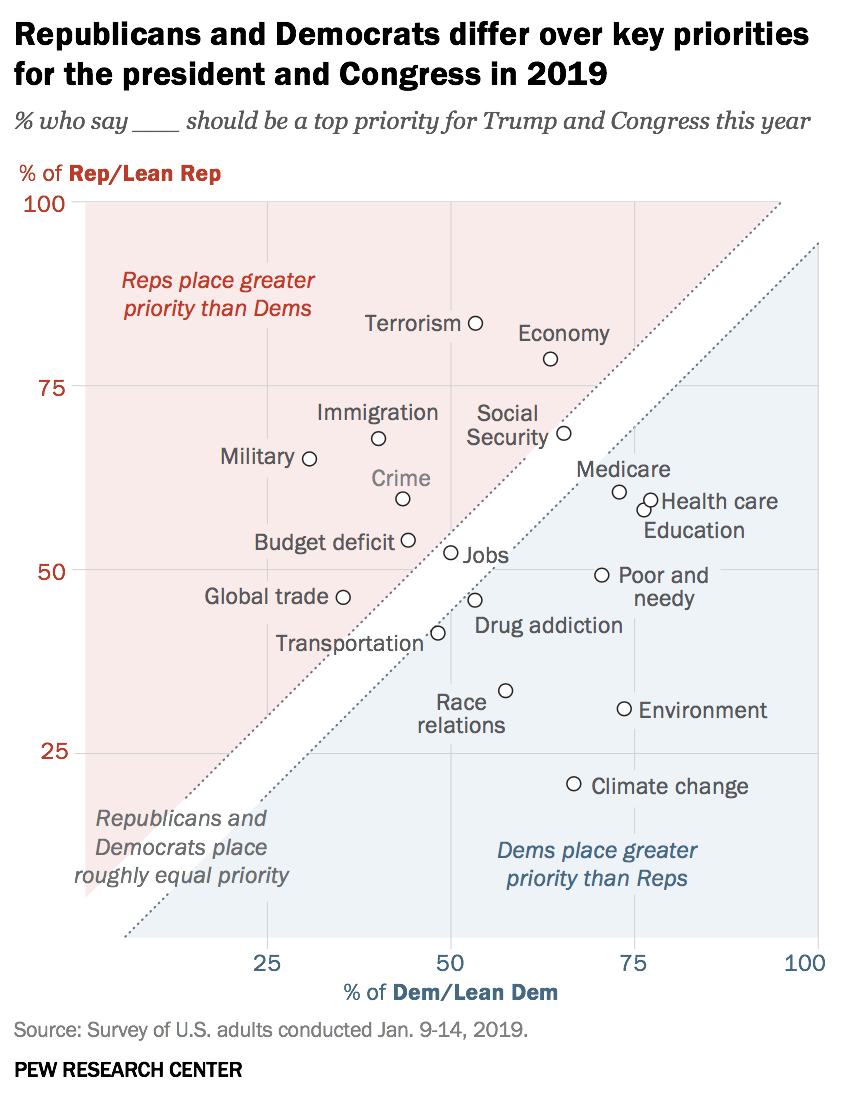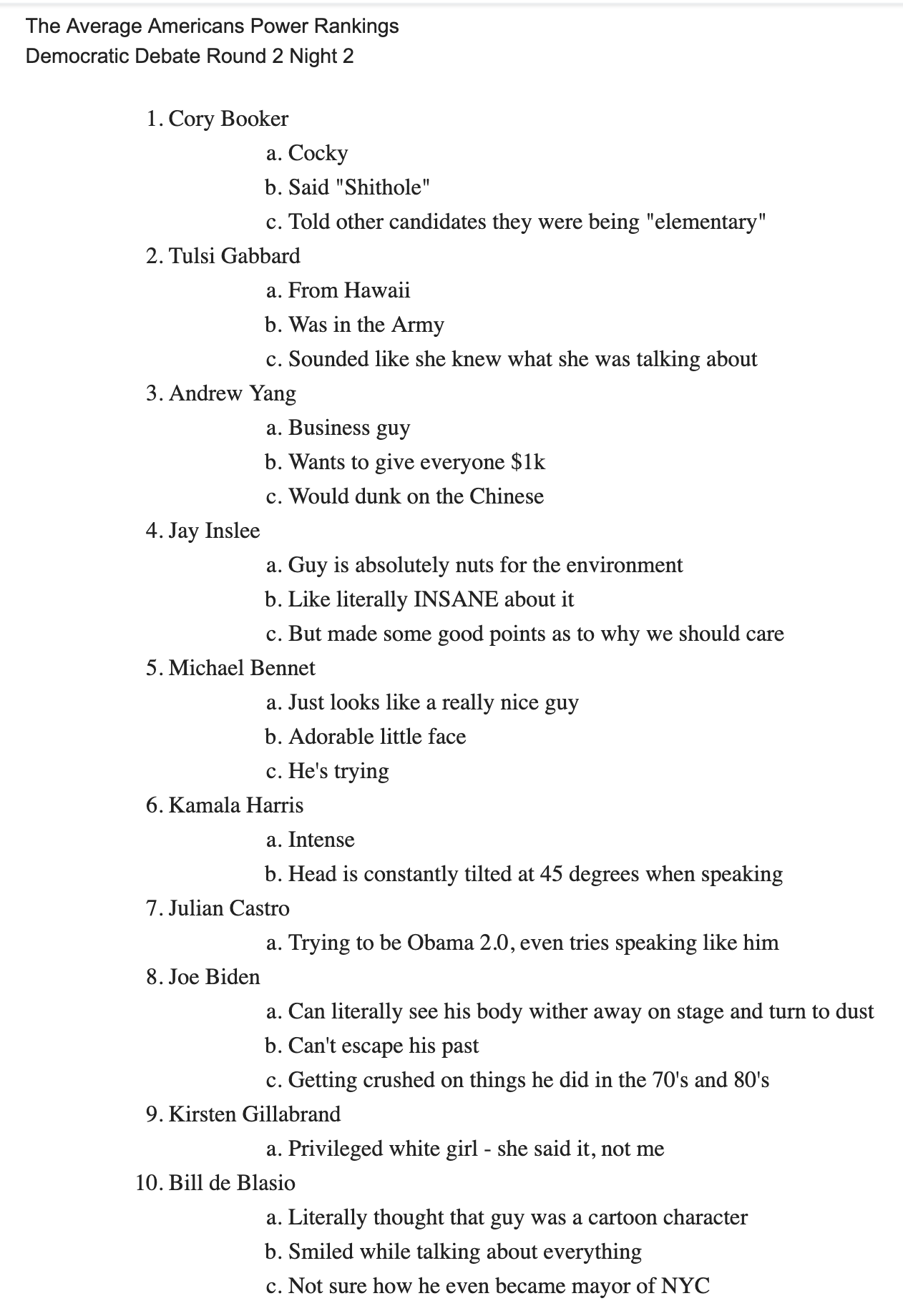Plus: one reader submits their review of the night.
A small programming note…
This newsletter is still pre-launch, which means you’re friends & family (or just found it coincidentally on the Substack website). But it’s time to build up some subscribers, so feel free to send this along to friends.
Have a question?
Remember: this newsletter is built around the readers. By the people, for the people. Submit your question by simply replying to this email.
Today’s read: 6 minutes.
Would you rather listen? Let me know. It’s a feature we’re working on.
A chart worth looking at.

What D.C. is talking about.
The debates (again). Last night featured Sen. Kamala Harris, former Vice President Joe Biden, Rep. Tulsi Gabbard, Sen. Cory Booker and New York Mayor Bill de Blasio, among others. It was a contentious debate from the start, with Harris (and everyone else who got the chance) flamethrowing Biden’s health care plan, record on civil rights and relationship with Obama every chance they got. 30 minutes in, it looked like Harris was making meat out of the competition, but then Tulsi Gabbard happened. The Hawaii representative, widely seen as a long shot, unloaded on Harris for her storied history of throwing people in jail for marijuana offenses and raising bail on inmates. Harris responded by slamming Gabbard as a “long shot” trying to get noticed and then pivoting back to Biden, which she did all night. For more on why they call her “Kamala the cop,” check out this story from Reason.
What Democrats are saying.
Cool it. The overarching narrative from the few Democrats who aren’t running for president is, “Why are we spending so much time attacking each other and not Trump?” The answer, obviously, is that this is the Democratic debate. But still, last night felt like grenade after grenade being thrown between allies, and it was tough not to wonder how Republicans will use the attacks last night as ammunition for the election in November, 2020. There were also a lot of potshots taken at Obama for his record of mass deportations and wars he never pulled out of, which had some people wondering whether the Democrats were totally clueless as to how to win the upcoming election.
What Republicans are saying.
Another win for Trump. There was no foreign policy talk, nothing about Robert Mueller and little about how health care prices have gone up because of Trump administration policies. Instead, Dems clobbered each other and showed off oppo research the Trump campaign may not have been privy too. Mostly, though, it seemed like they were running against Obama instead of running against Trump. That’s great news for a President who knows how to inflame divisions and will almost certainly use the candidates’ words against each other.
My take.
After Tuesday night’s debate, I had the overwhelming feeling that none of this mattered. Last night was different, though. As I documented on Twitter, it was informative to watch the debate alongside my girlfriend, who seemed stunned at Biden’s performance. She asked questions like, “Is he okay?” and “Is he unwell?” throughout the night. Kamala came off like the strongest candidate, but Gabbard’s attack lines will do real damage and are just a preview of what’s to come. Booker, too, had a strong night and seemed prepared in a way other candidates weren’t.
One more thing.
An enthusiastic reader from Pennsylvania sent in his thoughts on last night’s debate and “ranked” each candidate with comments. I thought it was an interesting (and funny) look into a young, white, centrist, male voter’s mind, so I figured I’d share:

Your questions, answered.
Reminder: this newsletter is by the readers and for the readers. If you want something answered, simply reply to the email and send over your question.
Mike from Philadelphia asked: What do you think will be the key issues heading into the primaries?
There are two answers to this question: one is what “will be” and the other is what “should be.” What will be: in all likelihood, it’s going to be Trump and race. I’ve seen some compelling arguments that Democrats would be wise to run on race relationships, paint Trump as an abnormal, dangerous racist, and ramp up turnout. But conventional wisdom from the politico class says Democrats should focus on health care, and polls consistently show health care as the issue liberals (and lots of conservatives) care about most. If the economy is doing really well or taxes are cut but health care costs are skyrocketing, it’s basically a wash. People notice when less money is coming out of their checks, and reducing the cost of employer-provided health care would be a big win for any Democrat. As the numbers wittle down, I expect the health care debate (Medicare-for-all vs. Obamacare and the free market) to take center stage.
Michael from north Jersey asked: I think that if any candidate truly tried to cater to Millennials, they would win in a landslide. Do you think there will be a candidate anytime soon that will cater to Millennials or would it be too risky for their political career?
I think there is a good case we have two candidates doing that right now: Bernie Sanders and Andrew Yang. Sanders millennial-based approach is seen through his policy priorities: he is laser-focused on the future of the country as it relates to climate change, eliminating student debt and providing free health care for all Americans. The elderly who are already raking in Medicare benefits have little incentive to push for expanding the system. If the overwhelming scientific consensus is to be believed, they won’t be around for the worst effects of climate change. And most didn’t go to college at a time when student loans caused crippling debt. So the message Sanders is sending resonates most with millennials, the oldest of which are now in their early 40’s. Of the youngest voters and even voters aged 18 to 44, Sanders is polling the best amongst this year’s candidates, as Vox explains here. That’s a pretty direct line between his policies and millennial support.
Yang, on the other hand, is just running a millennial-like campaign. He’s going after video game nerds, making the rounds on Reddit, using Twitter religiously, appearing on every podcast that will have him and swimming in memes meant to go viral with younger voters. He’s also asking his followers to join “the Yang gang.” As a result, he is crushing other candidates in web traffic data and building up a loyal, cultish following. Part of that is driven by the gamers, who envision a world where they can collect Yang’s $1,000/month Universal Basic Income check, quit their day jobs and do nothing but game. But his campaign is doing everything it can to own the airwaves on the lesser known media alternatives that older, more geriatric candidates in the race are ignoring. Somewhere between Yang’s campaign style and Bernie’s policies is the millennial candidate you’re looking for.
A story that matters.
The not so funny story of Marianne Williamson. Some people find her amusing and kooky. Others are taking her somewhat seriously. But the “spiritual guru” who is famous for self-help books and her relationship with Oprah actually holds some pretty scary views. She’s described diseases like AIDS and cancer as “psychic screams,” espoused anti-vax rhetoric and frequently invokes pseudo-science or non-answers in the place of real policy positions. People seemed to get a kick out of her, but this story on the danger of giving her a platform hit home with me. It’s worth a read. Click.
Tweet of the day.
Number(s) of the day.
Congressional endorsements so far: Biden (16), Harris (13), Booker (12), Warren (8), Klobuchar (4), Sanders (3). Congressional endorsements by this point in 2015: Clinton (126), Sanders (0). Courtesy of The Washington Post’s Dave Weigel.
Have a nice day.
Shoutout to the youth: a teenager from Ireland won a $50,000 award for developing a method to remove microplastics from water. Microplastics are so small they’re impossible to filter, and often end up being consumed by little fish who get eaten by big fish who get eaten by — you guessed it — humans. The teenager, Fionn Ferreira, did some fancy science stuff with a magnet and water solutions to get them out. His method is apparently very effective and could save us all. Forbes has you covered on the story.
Enjoying this newsletter?
It’s time to tell your friends. Please have them subscribe by forwarding this email or sending them this link. And don’t forget to submit a question!


